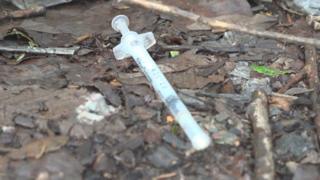
The UK government is holding a drugs summit in Glasgow to discuss measures to tackle the record number of deaths.
Almost 4,300 people died from drug misuse across the UK in 2018, a record figure, and the numbers for last year are expected to be just as high.
Deaths in England and Wales increased significantly but the rate remains much lower than in Scotland.
It accounted for more than a quarter of UK drug deaths, which was far higher than its share of the population.
UK drug misuse deaths
Rate per million of population
The latest figures showed an average of more than three people a day dying of drug overdoses in Scotland.
Drugs legislation is reserved to Westminster, which has led to clashes with the Scottish government over its approach to the crisis, such as blocking "safe consumption rooms".
It is more than three years since Glasgow City Council first proposed allowing users to take their own drugs under the supervision of medical staff at a special facility in the city.
They said the move, backed by the Scottish government, would encourage users who inject heroin or cocaine on the city's streets to enter a safe and clean environment.
The UK government's Home Office has refused to allow the Glasgow plans, saying a range of offences would be committed, including possession and supply of controlled drugs and knowingly permitting the supply of a controlled drug on a premises.
Crime and policing minister Kit Malthouse, who will chair the UK government's summit in Glasgow, said: "We must have firm enforcement action and do all we can on prevention, recovery and treatment too."
At the UK summit, Prof Dame Carol Black, the woman tasked with carrying out an independent review of drugs policy, will present her findings.
It follows the Scottish Drug Deaths Conference on Wednesday, which was attended by about 350 delegates.
Scotland's Public Health Minister Joe FitzPatrick told the audience that solutions must be found or "this senseless carnage will continue".
He called for a public health approach to the impact of drugs rather than trying to punish users for breaking the law.
The leader of Glasgow City Council, Susan Aitken, said her city had the most drug deaths in the UK, 280 in 2018.
"This is a critical situation for our entire city - we are in the throes of a crisis and an emergency response is required," she said.
Ms Aitken called on the UK government to support new approaches, such as safe consumption rooms, in an attempt to get addicts off the streets.
Analysis by BBC Scotland social affairs correspondent Chris Clements
Both the UK and Scottish governments agree that tackling addiction and rising drug death levels should be a priority.
However, both remain at odds over how best to help some of the country's most vulnerable addicts.
At the heart of the Scottish government agenda is a public health approach, exemplified by the drastic reduction in drug deaths in Portugal.
It involves decriminalising possession of small amounts of drugs, wrap-around services and potentially the introduction of so-called "fix rooms" - facilities where addicts can inject drugs safely under supervision.
But to do this, says the Scottish government, it requires devolution of drug policy and changes to the Misuse of Drugs Act. The UK government's Home Office are reluctant.
As well as Tory unwillingness to appear "soft" on drugs, Home Office policing minister Kit Malthouse has already said divergence in drug policy north of the border would be encouraging for English gangs seeking more opportunity to flood Scottish towns with illegal drugs.
Recovery charities have expressed fears that these two summits could end up being another political point-scoring exercise. If that's the case, the ones losing out are the ones dying.